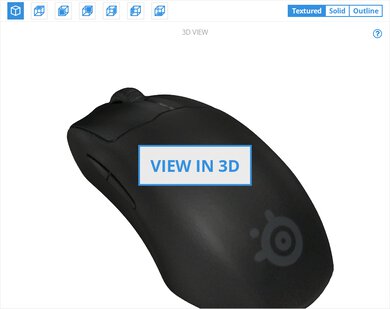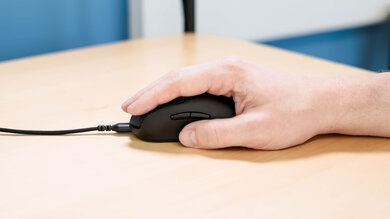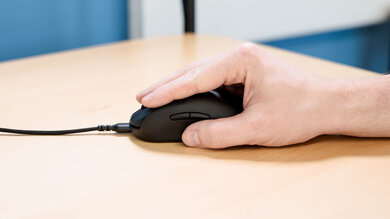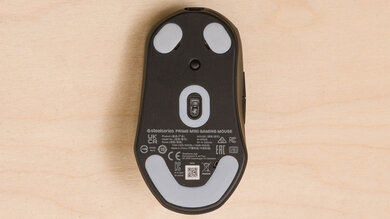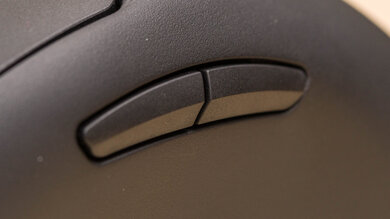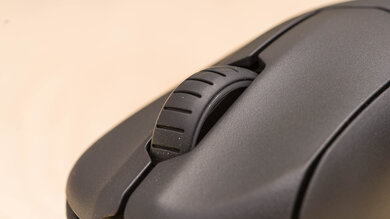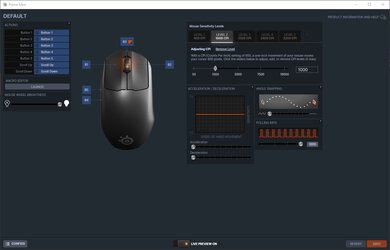The SteelSeries Prime Mini is a wired gaming mouse with a solid, matte plastic body covered in a tactile, textured finish. It has two side buttons on the left, a single RGB lighting zone in the scroll wheel, and an additional button on the underside that cycles CPI settings. It has a right-handed shape suitable for smaller-sized hands using a palm grip and small to large-sized hands using a claw or fingertip grip. However, it isn't suitable for extra-large hands using any grip type. Performance-wise, it has low click latency, a very low lift-off distance, and you can adjust the CPI by increments of 50 within a very wide range. Unfortunately, the unit we tested has some minor build quality issues. Also, the sensor is somewhat inconsistent, undershooting the set CPI more during fast cursor movements.
Our Verdict
The SteelSeries Prime Mini is decent for office and multimedia work. It feels well-built and has a comfortable shape suitable for all grip types and most hand sizes. You can also program all the buttons on the top of the mouse using the companion software compatible with Windows and macOS. Unfortunately, there are no wireless connection options available, and the mouse wheel lacks L/R tilt buttons and a free-scrolling mode.
-
Feels well-built.
-
Customization software compatible with Windows and macOS.
-
Wired-only.
-
Mouse wheel lacks L/R tilt buttons and a free-scrolling mode.
The SteelSeries Prime Mini is a great FPS gaming mouse. It's lightweight and feels well-built. It has mouse feet that glide very smoothly on mousepads and desks and a flexible paracord-like cable. It also has a comfortable, right-handed shape suitable for all grip types and most hand sizes. Performance-wise, it has low click latency, a very low lift-off distance, and you can adjust the CPI by increments of 50 within a very wide range. Unfortunately, the sensor is inconsistent and undershoots the CPI more during faster cursor movements.
-
Feels well-built.
-
Very lightweight.
-
Flexible and detachable paracord-like cable with USB-C connector.
-
Mouse feet glide very smoothly on desks and mousepads.
-
Dedicated CPI button is on the bottom of the mouse, making on-the-fly changes awkward.
The SteelSeries Prime Mini is great for MMO gaming, but it doesn't have nearly as many side buttons as a dedicated MMO gaming mouse. That said, you can program all of the buttons on the top of the mouse using the customization software compatible with Windows and macOS. It feels well-built and has a comfortable, right-handed shape suitable for all grip types and most hand sizes. It also has low click latency, a very low minimum lift-off distance, and you can adjust the CPI precisely by increments of 50 within a very wide range.
-
Feels well-built.
-
Very lightweight.
-
Flexible and detachable paracord-like cable with USB-C connector.
-
Customization software compatible with Windows and macOS.
-
Not nearly as many side buttons as a dedicated MMO gaming mouse.
-
Dedicated CPI button is on the bottom of the mouse, making on-the-fly changes awkward.
The SteelSeries Prime Mini is excellent for ultra-light gaming. It's very lightweight and feels well-built. Its mouse feet glide very smoothly on mousepads and desks, and its paracord-like cable feels high quality. It also has a comfortable, right-handed shape suitable for all grip types and most hand sizes. Performance-wise, it has low click latency, very low lift-off distance, and you can adjust the CPI by steps of 50 within a very wide range.
-
Feels well-built.
-
Flexible and detachable paracord-like cable with USB-C connector.
-
Mouse feet glide very smoothly on desks and mousepads.
-
Dedicated CPI button is on the bottom of the mouse, making on-the-fly changes awkward.
The SteelSeries Prime Mini is inadequate for travel use as it's a wired-only mouse, making it cumbersome to use in small spaces like buses, trains, or planes. Despite being slightly smaller than the full-sized SteelSeries Prime, it's still quite bulky and likely won't fit in most laptop cases. That said, it feels well-built and has a comfortable shape suitable for small to large-sized hands using most grip types. It also has a removable cable, making it a more portable option than most wired gaming mice.
-
Feels well-built.
-
Wired-only.
-
Bulky; may not fit in most laptop cases.
- 7.0 Office/Multimedia
- 8.5 Video Games (FPS)
- 8.0 Video Games (MMO)
- 8.8 Ultra-Light Gaming
- 5.3 Travel
Changelog
- Updated Oct 19, 2021: Review published.
- Updated Oct 14, 2021: Early access published.
- Updated Oct 08, 2021: Our testers have started testing this product.
- Updated Oct 06, 2021: The product has arrived in our lab, and our testers will start evaluating it soon.
- Updated Oct 03, 2021: We've purchased the product and are waiting for it to arrive in our lab.
Check Price
Differences Between Sizes And Variants
The SteelSeries Prime Mini belongs to a lineup of SteelSeries mice that share a similar shape and other features. The base version, called the SteelSeries Prime, is a larger version of this mouse. The SteelSeries Prime Mini retains most of the same features, but in addition to being slightly smaller, it has higher quality mouse feet and a USB-C connector in place of the micro-USB connector on the full-size version. The unit we tested is black, and there are no other color variants available. You can see the label for our unit here.
Compared To Other Mice
The SteelSeries Prime Mini is an excellent wired gaming mouse and a scaled-down version of the SteelSeries Prime. Compared to the rest of the mice in the SteelSeries Prime lineup, this mouse is missing some of the more exotic features found on other models, including OLED screens or secondary lift-off distance sensors. That said, like the other mice in the series, it has proprietary magnetic optical-mechanical switches that provide very crisp clicks. SteelSeries claims these switches provide more consistent clicks, quicker response times, and have longer lives due to having fewer mechanical components to wear out. Overall, this mouse is a great choice for anyone interested in the SteelSeries Prime but in a smaller, shorter package.
For more recommendations, check out our picks for the best wired mice, the best gaming mice, and the best SteelSeries mice.
The SteelSeries Prime Mini is a scaled-down version of the SteelSeries Prime, but it also has several added improvements. The Mini has better quality virgin grade PTFE mouse feet, and its paracord-like cable has a USB-C connector, while the full-sized Prime cable has a Micro-USB connector. On the other hand, the Prime feels somewhat better built. Both mice are suitable for all hand sizes, but the Mini is better suited for smaller hands, while the full-sized Prime is more accommodating to larger hands.
The Razer Viper Mini and the SteelSeries Prime Mini are excellent wired gaming mice with comparable performance. The Razer is marginally lighter and feels sturdier. It also has lower click latency. Additionally, you can set a HyperShift button to enable a secondary layer of programmable buttons. On the other hand, the SteelSeries has a much wider CPI range, a more precisely adjustable CPI, and a lower lift-off distance. It also has customization software compatible with Windows and macOS, while the Razer only has software compatible with Windows.
The SteelSeries Prime Mini is a smaller, wired-only version of the SteelSeries Prime Wireless. The Mini is significantly lighter and has much lower click latency. It also has a lower minimum lift-off distance, and the software allows you to set the CPI more precisely. On the other hand, the Prime Wireless feels better built and has a somewhat more consistent sensor. Both mice are suitable for all grip types, but the Prime Wireless is more accommodating for larger hands, while the Mini is better suited for smaller-sized hands.
The BenQ ZOWIE EC2 and the SteelSeries Prime Mini are wired gaming mice with similar shapes, but the SteelSeries has better overall performance. The SteelSeries is significantly lighter and feels sturdier. It also has a more flexible cable and better quality mouse feet. Performance-wise, it has a lower lift-off distance and a much wider CPI range. You can also precisely adjust the CPI by increments of 50, while you can only choose between four preset CPI settings on the BenQ. Additionally, the SteelSeries has customization software, which the BenQ lacks. On the other hand, the BenQ has a more consistent sensor.
The SteelSeries Prime Mini is a better-wired gaming mouse than the SteelSeries Rival 710. The Mini is significantly lighter and has a more flexible cable. It also has better quality mouse feet. Performance-wise, it has a wider CPI range, a CPI you can adjust more precisely, a lower lift-off distance, and lower click latency. On the other hand, the Rival 710 feels somewhat sturdier and has a more consistent sensor. It also has a CPI button behind the scroll wheel, which is a feature the Mini lacks.
Test Results
The SteelSeries Prime Mini feels well-built overall. The plastic body feels very solid, the textured plastic finish feels good, and the button clicks and scroll wheel feel very satisfying. Unfortunately, there's a slight rattle from the scroll wheel when shaking the mouse. Additionally, you can activate the left-click button with enough pressure applied to the underside of the mouse. However, this is unlikely to present any problems while using the mouse normally.
The SteelSeries Prime Mini is a slightly smaller version of the full-sized SteelSeries Prime, but it retains the same comfortable, right-handed shape. It also has the same textured plastic surface finish as the full-sized version. SteelSeries refers to this surface finish as a "VD130 tactile microtexture body," where the VD130 refers to its surface finish rating according to the standard set by the Society of German Engineers.
The SteelSeries Prime Mini has a high-quality, paracord-like cable, though it isn't as flexible as some other paracord-like cables we've tested, and it retains some kinks from packaging. That said, it's detachable, which makes the mouse more portable and makes the cable easier to replace if it gets damaged. It also has a USB-C connector compared to the SteelSeries Prime, which has a micro-USB connector.
The feet glide very smoothly on desks and mousepads, but they produce a slight scratching sound when used directly on desks. The feet are higher quality, virgin-grade PTFE compared to the full-size SteelSeries Prime we tested, which has regular PTFE feet.
The available polling rate settings on the SteelSeries Prime Mini are 125Hz, 250Hz, 500hz, and 1000Hz. SteelSeries advertises a minimum CPI of 100 with CPI adjustment steps of 100, but the software allows you to make CPI adjustments in increments of 50 down to a minimum of 50 CPI. Unfortunately, the sensor on our unit is somewhat inconsistent. It undershoots the set CPI considerably more during fast cursor movements than slower ones, with a slow CPI error rate of -1.64% and a fast CPI error rate of -11.32%.
You can program all buttons on the top of the SteelSeries Prime Mini. There's an additional button on the underside of the mouse that cycles between five CPI settings when pressed or between four polling rate settings when held.
Note: This mouse uses magnetic optical-mechanical switches, which SteelSeries claims produce more consistent clicks and quicker response times.
The SteelSeries Prime Mini has modern and clean-looking software. The settings are all laid out on one page, and the sliders are easy to control. Unfortunately, there's no option to adjust the lift-off distance.
Comments
SteelSeries Prime Mini: Main Discussion
Let us know why you want us to review the product here, or encourage others to vote for this product.



